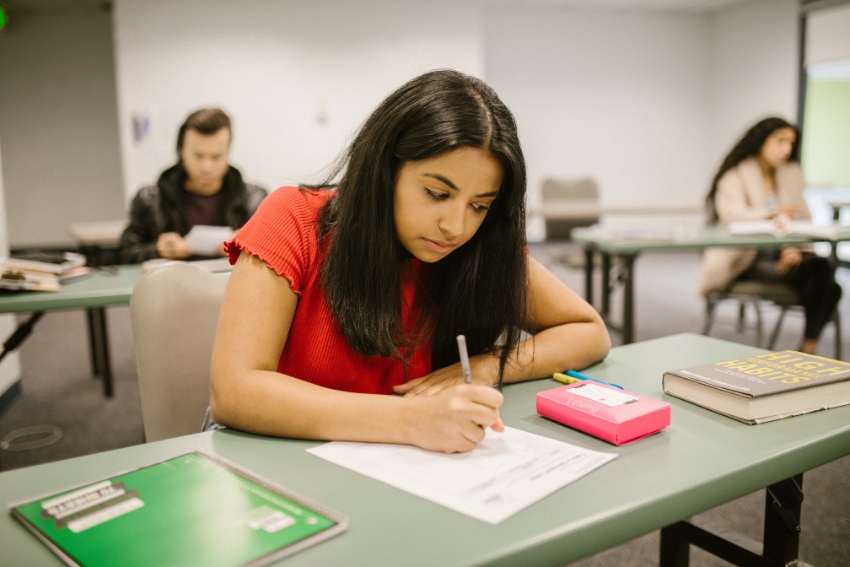Navigating the world of GCSE exams can be a challenging journey for both parents and students. These pivotal assessments mark a significant step in your child’s academic and future career path. As a parent, your role in guiding and supporting your child through this period is invaluable. This guide aims to demystify the process and equip you with practical strategies to help your child succeed.
- What are GCSEs and Why They're Important?
- 10 Ways Parents Can Help Their Child Revise for GCSEs
- 1. Create a Distraction-Free Study Environment
- 2. Encourage Effective Time Management
- 3. Promote Healthy Study Habits
- 4. Utilise a Variety of Revision Techniques
- 5. Make Use of Technology and Online Resources
- 6. Engage With Past Papers
- 7. Foster a Positive Mindset
- 8. Monitor Progress and Adjust as Necessary
- 9. Encourage Open Communication
- 10. Consider Private Tutoring with Edumentors
- Conclusion
What are GCSEs and Why They’re Important?
GCSEs (General Certificate of Secondary Education) are the primary academic qualification awarded in a specified subject, typically taken by students aged 14-16 in England, Wales, and Northern Ireland.
- Foundation for Future Studies: Achieving strong grades in GCSEs can determine A-level subjects, university admissions, and future career paths.
- Skill Development: Beyond academic knowledge, GCSEs help students develop critical thinking, time management, and study skills.
- Personal Growth: The revision process and exam preparation can boost personal discipline, resilience, and confidence.
Why Early Preparation is Key
Starting revision early is crucial for a deep and thorough understanding of the subjects. Here are some steps to ensure your child begins their preparation on the right foot:
- Create a Study Plan: Develop a revision schedule together, breaking down subjects into manageable chunks.
- Set Goals: Help your child set realistic, achievable goals for each revision session.
- Regular Review: Encourage your child to review their notes regularly to reinforce their learning and identify any gaps.

10 Ways Parents Can Help Their Child Revise for GCSEs
Supporting your child through their GCSEs is a multifaceted effort that goes beyond merely encouraging them to hit the books. Your involvement can significantly impact their motivation, efficiency, and overall mental well-being. Here are detailed, actionable tips to help your child navigate their GCSE revision:
1. Create a Distraction-Free Study Environment
- Ensure a quiet, well-lit space dedicated to study, away from household noise and interruptions.
- Provide necessary supplies, like stationery, highlighters, and note-taking materials, to encourage an organised study routine.
2. Encourage Effective Time Management
- Help them develop a detailed study timetable that includes breaks, extracurricular activities, and revision time for each subject.
- Teach them to prioritise their subjects and topics based on their strengths and weaknesses.
3. Promote Healthy Study Habits
- Stress the importance of regular, short breaks to avoid burnout. The Pomodoro Technique (25 minutes of study followed by a 5-minute break) can be highly effective.
- Encourage a good night’s sleep, healthy eating, and regular physical activity to maintain optimal mental and physical health.
4. Utilise a Variety of Revision Techniques
Different techniques work for different students. Encourage active revision methods like flashcards, mind maps, quizzes, and teaching concepts back to you. For helping your child build stronger maths skills in particular, you might find this advice on how to help your child excel in maths very useful.
5. Make Use of Technology and Online Resources
- Direct them to reputable online resources and apps that offer interactive learning tools, quizzes, and video tutorials.
- Encourage the use of educational platforms like BBC Bitesize for comprehensive subject breakdowns and revision guides.
6. Engage With Past Papers
- Practice with past exam papers to familiarise them with the exam format, question styles, and time management under exam conditions.
- Review completed papers together or with a teacher to identify areas for improvement.
7. Foster a Positive Mindset
- Maintain a supportive and encouraging tone. Celebrate their efforts and progress rather than just results.
- Teach them to view challenges as opportunities to learn and grow, reinforcing a growth mindset.
8. Monitor Progress and Adjust as Necessary
- Regularly review their study plan and progress, being flexible to adjust strategies as exams approach or if certain subjects require more focus.
- Encourage them to set achievable, incremental goals to keep motivated.
9. Encourage Open Communication
- Keep lines of communication open. Discuss their feelings and any challenges they’re facing, offering a listening ear and constructive advice.
- Encourage them to seek help from teachers or peers if they’re struggling with specific topics.
10. Consider Private Tutoring with Edumentors
- For subjects where your child may need extra help or confidence, consider the benefits of private tutoring. If you’re unsure whether your child needs a tutor, there are several key indicators to look for.
- Edumentors offers a unique platform connecting students with tutors from the UK’s top universities. These GCSE tutors not only provide expert knowledge in their subject areas but can also relate closely to your child’s experiences, boosting both their confidence and understanding.
Conclusion
Your role in your child’s GCSE preparation is crucial. By implementing these actionable tips, you provide not just academic support but also the emotional and mental guidance necessary for them to thrive. Each child’s needs and learning styles are unique, so be prepared to adapt and respond to what works best for your child, ensuring their journey through GCSEs is as rewarding and stress-free as possible.
Also check our blog post about EHC Plan and child in need: “Child in Need – What is an EHC Plan?”









